
A Conversation with Matthew P. Mayo
Lowestoft Chronicle interview by Nicholas Litchfield (October 2013)

In the last six years, ever since the publication of his first novel in 2007, Matthew P. Mayo has authored more than two dozen books and dozens of short stories. His novel, Tucker’s Reckoning, won the Western Writers of America’s 2013 Spur Award for Best Western Novel, his short fiction has been a Spur finalist and a Western Fictioneers Peacemaker Award finalist, and his nonfiction books have garnered praise from numerous newspapers and magazines, including The Boston Globe and Chicago Tribune.
Recently, Lowestoft Chronicle managed to hunt down Mayo, who is currently traveling extensively across North America with his wife, in an Airstream trailer, to discuss his latest novel, The Hunted, as well as some of his other books and short stories.
Lowestoft Chronicle (LC): Your latest novel, The Hunted, is not only a truly great Western, but also a rivetingly gruesome horror story. There is a high body count of very grisly deaths, from people being scalped or gutted or burned alive. In fact, Chapter 34 is impossible to read on a full stomach. At one point in the novel you write: “She didn’t think it was possible to live through any more horrors and still remain in control of her mind. And then she knew that such a hope was foolish. Of course there were more horrible things to come, if only for the fact that there were still people alive for them to happen to…” What inspired The Hunted? Did you set out to write such a gory novel or did it simply happen that way as you began to write it?
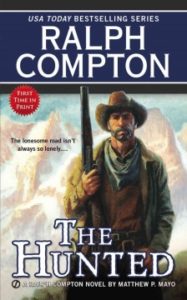
Matthew P. Mayo (MPM): Thank you, Nicholas, for your interest in my writing and for inviting me for an interview. I am most definitely flattered—you had me at “truly great.” I’m surprised to hear you feel it is a horror story. It does indeed have gruesome moments, but the rough predicaments and tortures depicted I based on treatments I’ve read about in journals and other historic documents.
It’s also a study of humans and their seemingly bottomless ability to treat each other, nature, and animals with disdain and savagery. Therefore, I don’t see The Hunted as a horrific novel, but as an exploration of various aspects of humanity and inhumanity. I hope that doesn’t sound grandiose…. Mostly I want to write ripping yarns with lots of action, romance, and danger.
As to what inspired The Hunted, as with all my books, its inspiration stems from a number of things—people I’ve met, places I’ve been, books I’ve read. It also has a healthy dose of some of my favorite subject matter, both as a reader and as a writer: cold, wintry settings. Whatever is challenging in wilting heat feels doubly difficult in extreme cold and blizzardlike conditions.
LC: It’s a fairly long novel, and anyone who has read it can clearly see that every sentence is deftly written. I’ve heard you say that you write your novels from beginning to end before any edits. How long did it take you to write and edit this one? With a couple of successful Ralph Compton novels under your belt already, was writing The Hunted a faster, smoother process than with the other two books?
MPM: Thanks, yes, The Hunted is standard-length, roughly 80,000 words. I do like to write novels from beginning to end, no looking back. It works for me, keeps it a fresher storytelling experience. Then I go back and rework it for as long as it needs. I wrote The Hunted in 2012 while working on other projects, and all in all, it took a few months.
Yes, overall the novel-writing process is becoming more familiar. I feel I’m getting better with each book at writing a cleaner first draft, though I still take as much time as I’m able to go over and over the manuscript.
LC: In keeping with all your Westerns, there are a good number of despicably savage characters in The Hunted. The Shoshoni Indian, Blue Dog Moon, is perhaps the most sadistic of all, but Rollie Meecher doesn’t appear to have any redeeming qualities. Do you enjoy creating grotesque villains? What would you say are the things you enjoy most about writing novels? And is there a moment when you’re writing the plot or the novel itself when you say, can I put the character through that or is it too much?
MPM: Oh, I don’t know, I think ol’ Rollie Meecher isn’t such a bad bloke. He just had a hard time growing up. Nah, on second thought he’s a hydrophobic beast who deserves two in the hat. Who doesn’t enjoy reading and writing about characters with certain over-the-top qualities? One of the things I most enjoy about writing is creating interesting characters, then putting them in challenging situations that test their skills—or lack of them.
There have not been too many moments in writing a novel when I’ve said, “Nah, that’d be too over the top.” More often than not I’ll say, “How much more can I put this goober through?” And then I push that. Readers seem to like this and it keeps the story hopping. That said, I work to keep situations believable and (somewhat) plausible, as opposed to being outlandish for no reason.
LC: One of the things that make The Hunted such a notable book is the character Charlie Chilton, also known as Shotgun Charlie. There must be a dozen unpleasant characters in the novel, with a few of them really loathsome, but in the case of Charlie you’ve managed to produce a very memorable, larger-than-life hero. It’s almost as if, after creating a villain as powerful as Blue Dog Moon, you needed to think up someone who would be a believable match for him. You describe him as built like a bear and, later, you actually have him fighting wolves with his bare hands. How did the character come about? Did you have someone or perhaps even a bear in mind when you imagined him?
MPM: I’m pleased to hear you like Shotgun Charlie. I did indeed want to create a larger-than-life fellow. Ol’ Charlie’s one of my favorite characters—a quiet-type ass-kicker with a heart of gold. I had a few folks in mind—fictional and real—when I came up with him. Hoss from “Bonanza” is one, my father, a big man—a dairy farmer—quiet, thoughtful, and kind, is another. I didn’t intentionally set out to make Charlie the antithesis of Blue Dog Moon, but I find your observation interesting.
I also would like to point out that Hester and her sister, Delia, are two tough cookies who take lickings and dole out kickings with the best of them. It’s very important to me that my female characters be as distinctive, rugged, and heroic as their male counterparts. After all, the Old West wasn’t really populated with square-jawed men in white hats protecting simpering women!
LC: Hester and Delia are strong characters, as you say, and your novels do usually contain strong-minded women who are able to cope with the harsh situations you put them in. Characters like Jenna Winters in Winters’ War and Emma Farraday in Tucker’s Reckoning prove to be just as physically capable as Hester is in The Hunted, in that they are able to tackle the villains themselves. In fact, Emma Farraday, with her men’s denims, broad-brimmed hat, and work boots, who rides a horse like a man, is perhaps the most resilient character in Tucker’s Reckoning. Do you think that having a particularly strong female character like Emma as one of the two main characters in the book helped Tucker’s Reckoning win the Spur Award? What would you say made that book your most endearing one? And what was your inspiration for Lord Tarleton, the English dandy? He seems rather different from your other characters.
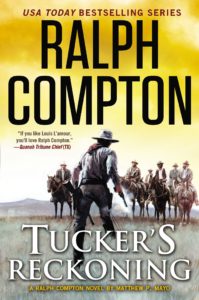
MPM: I’m pleased you recognize the strong female characters in my books. I work hard to make sure they hold a bold, balanced place in my stories. I’m sure Emma Farraday has had a positive influence in helping make Tucker’s Reckoning popular with readers, primarily because she’s a tough, no-nonsense character who makes things happen.
As to inspiration for Lord Tarleton, I believe he is an amalgam of several characters and snippets of information I’ve read about or met or experienced. Back in the day, overprivileged travelers from a number of countries made their way to the American West, some with a yen to accumulate new experiences, some to gobble up resources and make bigger fortunes before moving on, leaving scars and wreckage in their wakes. Tarleton’s definitely one of the latter, and so fun to write about.
LC: You said in an interview once: “I knew I was going to let someone escape from a fight, but at the last minute, he seemed to need to die.” Of all your characters, the hardest one to see put in peril was the droll old-timer Squirly Ross, in Dead Man’s Ranch. When you were writing that book, was there a moment when you considered sparing Squirly?
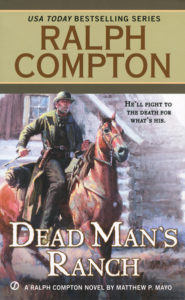
MPM: Squirly Ross is a special character who served his purpose and who had to lurch offstage, trailing blood and the shadows of a lifetime of good intentions. I rarely plan on peril-izing a character early on; rather, I find that situations arise in which I find that diminishing them will help heighten the drama and tighten the tension. I try to not be too sentimental about my characters because then the story will be toothless and predictable and more closely resemble a church social event than a thrilling tale of adventure. That said, I do feel badly when I lay low a character I’ve come to enjoy spending time with, as I did with ol’ Squirly.
LC: I’ve read that your first three novels were scheduled to be published by Leisure Books, an imprint of Dorchester Publishing, but the demise of Dorchester’s mass-market paperback line persuaded you to withdraw from the publishing deal. The books were subsequently published by the great UK-based publisher Robert Hale Ltd, as part of their Black Horse Western series. As you were a first-time author and both of these were well-known publishing houses, was it a difficult process placing Winters’ War, the first of these novels, with either publisher?
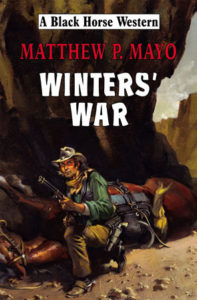
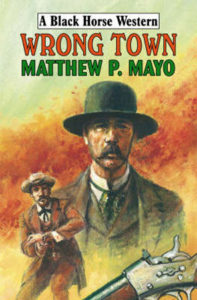
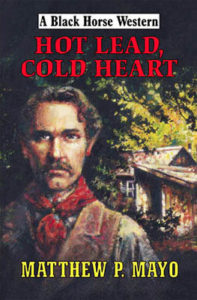
MPM: Well, you’re slightly mistaken in the sequence of events. Those three books were first published by Robert Hale Ltd, as part of their Black Horse Western line. Then the offer from Dorchester came to reprint them as mass-market paperbacks for the US audience. Unfortunately, Dorchester imploded shortly thereafter. So my wife and I retooled the books, significantly in a number of ways, and reissued them as ebooks via our own imprint, Gritty Press (grittypress.com).
It wasn’t particularly difficult to sell Winters’ War to Hale for the BHW line. I read their guidelines, joined the Yahoo group for and run by writers for the line, and was given excellent advice by a number of those writers. Then I worked on the story some more until it felt right, sent it off, and was thrilled to receive the acceptance. Hale was a wonderful publisher to deal with, very attentive and responsive. I can’t recommend them highly enough.
LC: Ever since 2007, you’ve had more than a dozen books published and your short stories have appeared in more than a dozen anthologies. Were you writing fiction prior to 2007? And how did you get involved with Moonstone Books and DAW Books, the latter being, primarily, a science fiction and fantasy publisher?
MPM: Actually, since 2007, I’ve had about two dozen books published, a number of them under “house names” for various lines. I believe about half of my books have been non-fiction, half of them novels.
I have written fiction for many years, and started publishing stories, poems, and articles back in high school. It wasn’t until 2000 or so that I began getting serious about writing and submitting fiction. I didn’t consider tackling a novel for a few years because it seemed like such a daunting task, but I finally took an online novel writing course that was useful.
I ended up getting my MFA degree in writing in 2003 and that proved tremendously helpful. My first novel, Go Fish!, a satirical comedic romp about pro bass fishing and America’s over-commercialization, came out of that. A few early readers compared it to a Coen Brothers film. It is unpublished, but that might soon change. Stay tuned…
Regarding contributing to the Moonstone anthologies, I was fortunate to know Howard Hopkins, a top-notch and prolific writer of Westerns, horror, and young adult novels who, sadly, passed away not long ago. I encourage readers to read his work—it’s great. He was also editing anthologies for Moonstone Books and offered me spots in a couple of them. I’ve edited a few anthologies myself, so I appreciate what a hefty task they can be.
With the stories I did for the DAW Books anthologies, it was a matter of having come to know the fine writer Jean Rabe through other avenues—I contributed to a newsletter she edited for International Association of Media Tie-In Writers (IAMTW). She had edited a number of anthologies and when new ones came up, she asked me if I might be interested in contributing. I wrote a time-travel Western story for Timeshares and for Steampunk’d! I wrote “Scourge of the Spoils.” That story ended up nominated for a Western Fictioneers Peacemaker Award. Since then I’ve worked up plans for a series of books based on the story. The first novel is written and I’m currently editing it.
LC: In the past you’ve said, “With fiction, I prefer to keep mum about work that’s not published yet, unless it’s about to be.” This sounds like a good indicator that Go Fish! has found a publisher already. Is that the case? Incidentally, I know you’ve contributed articles to fishing magazines in the past. I take it you’re a fishing aficionado?
MPM: That may well be the case—mum’s the word.
And as far as fishing goes, I’m no aficionado, just someone who enjoys wetting a line now and again. Fly-fishing is a pleasant pastime that allows folks to get out and about in the great outdoors, away from the gadgets and gewgaws that we have all made part of our daily lives (cell phones, computers, etc.). I’ve never cared if I caught any fish, merely “standing in a river, waving a stick” (to paraphrase the excellent essayist, John Gierach) is a relaxing, contemplative way to spend time. I’ve also had the good fortune to work in an editorial capacity on a couple of fishing magazines.
LC: You’ve said that you write what interests you, and you’ve also said that, as a kid, you wanted to see your name on a mass-market paperback. Did you always want to write genre fiction? Am I correct in thinking that, so far, all your published novels have been Westerns? What made you decide to focus chiefly on writing fiction in the Western field?
MPM: I always wanted to write fun, ripping tales that made me howl with delight when I wrote them and made readers howl (hopefully not in pain!) when they read them. Because that’s the sort of reading material I have always enjoyed. Growing up, I never considered what genre a book might be from, I wanted to read a good story. Distinctions such as “genre” versus “literary” generally create divisions that aren’t useful, at least to me as a writer and as a reader. I read what interests me, and I do the same with writing.
So far my published novels have been set in the American West, but the coming year should see a change in that mix. I choose Westerns because I love reading them and writing about the region, the time period, and the characters who populate it. I also choose to work in the “Western” genre because there was and is room in the market. And, for that, I feel fortunate.
LC: I read that you write somewhere between 20,000 to 30,000 words per week. Am I correct in thinking that you have a number of other completed manuscripts awaiting publication? Some of the projects I’ve read about include a contemporary comic adventure series, a noir crime novel, and a second Roamer novel. You’re also contributing a short novel to the Western Fictioneers’ West of the Big River series. Can you talk about any of these books or are they still very much works in progress?
MPH: I only write lots of words in a week when I’m on deadline. Unfortunately, I’m on deadline much of the time these days. But it’s great training and a fun experience. And when I get to feeling whiny about it, I remember all those jobs I’ve had that were less than ideal (though they did provide grist for the writing mill). I have a few other novels and novellas written, but not yet published. Some of them aren’t ready, some of them hopefully are.
As I mentioned previously, this year will see new work out there, some Western-based, some non-Western. I prefer to keep mum about most of it until I have solid traction, but I can say the second Roamer novel (Roamer, Book 2: The Greenhorn Gamble) is in good shape. In fact, the first chapter is included as a teaser/bonus chapter at the end of the Gritty Press ebook of my novel, Hot Lead, Cold Heart.
LC: Among your short stories are adventures involving the characters Sherlock Holmes and the Avenger, Richard Henry Benson. Was it challenging writing tales involving these well-established characters, and are there any other literary characters you would love to write a short story about?
MPM: It was a bit challenging writing about established, well-known, and well-liked characters, but the fun factor overrode any difficulties that arose in the writing process. I believe readers liked my offerings. I enjoyed writing about those characters, their inherent quirks, and was fortunate enough in my Holmes story to include Arsene Lupin, the gentleman thief, who was a literary contemporary of Holmes. I very much enjoyed writing those stories for Moonstone Books and would love to contribute to future anthologies, should the opportunity arise.
Thank you, Nicholas, for this fun, wide-ranging interview. I’m flattered that you like my work and I hope to continue writing stories that readers like.
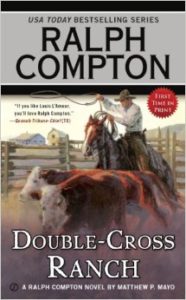
At the end of October, Matthew P. Mayo wrapped up his next Ralph Compton novel, Double-cross Ranch, which will be published April 1st 2014. The novel is available to preorder from Amazon and elsewhere.
About the Author
Matthew P. Mayo has written more than twenty-five books and dozens of short stories. His novel, Tucker’s Reckoning, won the Western Writers of America’s 2013 Spur Award for Best Western Novel. He has also been a Spur finalist in the Short Fiction category and a Western Fictioneers Peacemaker Award finalist. His novels include Winters’ War; Wrong Town; Hot Lead, Cold Heart; Dead Man’s Ranch; Tucker’s Reckoning; The Hunted; and many more. He also contributes to other popular series of Western and adventure novels.
Matthew’s nonfiction books include Cowboys, Mountain Men & Grizzly Bears; Bootleggers, Lobstermen & Lumberjacks; Sourdoughs, Claim Jumpers & Dry Gulchers; Haunted Old West; Speaking Ill of the Dead: Jerks in New England History, and numerous others. He collaborated with his wife, photographer Jennifer Smith-Mayo, on a series of popular hardcover books, including Maine Icons, New Hampshire Icons, and Vermont Icons.
The Mayos also run Gritty Press (www.GrittyPress.com) and rove North America in their Airstream trailer in search of hot coffee, tasty whiskey, and high adventure. Stop by Matthew’s website (www.MatthewMayo.com) for a chin-wag and a cuppa mud.
About the Interviewer
Nicholas Litchfield is the founding editor of Lowestoft Chronicle. You can read more about him at his website: nicholaslitchfield.com
